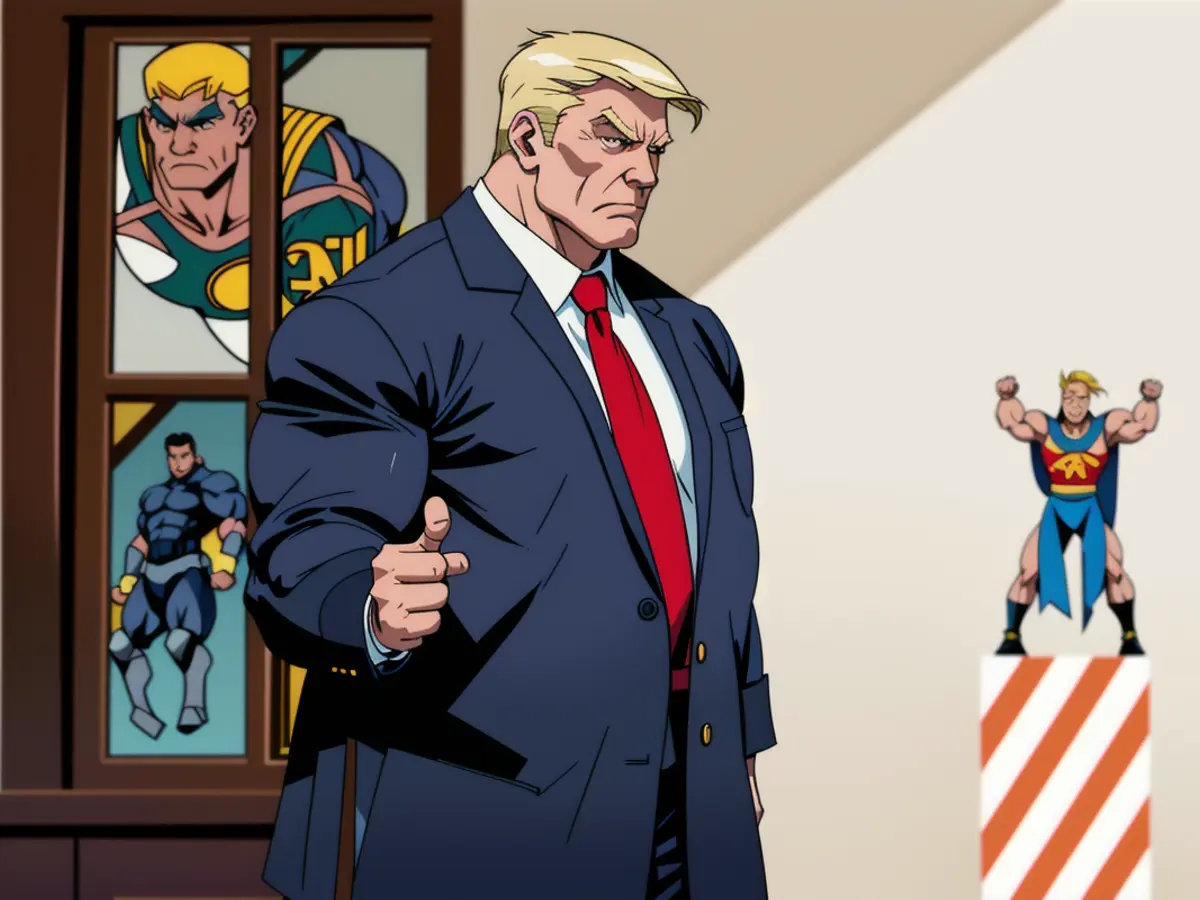Standoff in the Global Trade War: Trump's Ultimatum to China
- Trump sets deadline for Beijing, requiring a response by midday
It's crunch time for China in the raging global trade war instigated by US President Donald J. Trump. Trump has given Beijing till Tuesday noon to call off the recently declared 34% tariffs, or else he'll impose a staggering 50% tariff on their exports, he proclaimed at a gathering for Japanese Prime Minister Shinzo Abe and Israeli Prime Minister Benjamin Netanyahu. If implementing the new tariffs on China, the pending second round of the mammoth American tariff proposal would follow suit on the same day, targeting countries with substantial trade deficits, including the EU.
Despite the White House's stern warnings, China remains resolute in maintaining its tariffs. If the US continues down this path, "China will resolutely take retaliatory measures to safeguard its own rights and interests," stated the Chinese Commerce Ministry. If the US insists on intensifying its trade restrictions, "China will accompany it to the end," the Ministry added, characterizing the US actions as "bullying." China will never capitulate to such tactics.
Should China opt for the 50% tariff, the collected tariffs would reach an alarming 104%. Previously, the US had already imposed a 20% tariff on Chinese goods. This new round of worldwide tariffs introduces an additional 34% tariff for China. Trump stated that China had enforced its "retaliatory tariffs" of 34%, in defiance of his earlier caution that he would impose further tariffs if such measures were taken.
Trump has ruled out the prospect of suspending the tariffs during his meeting with Netanyahu. "No way, we're not doing that," he replied when asked about the topic. White House officials had previously dismissed such rumors as "fabrications." Trump indicated that several nations are eager to negotiate with the US. He cited a conversation he had with Japanese Prime Minister Shigeru Ishiba earlier that day.
In an unusual move, Trump also refused to reciprocate Israel's planned reductions in tariffs and trade barriers. When asked if the US would then roll back the additional 17% tariffs on Israeli goods, Trump replied cryptically, "Maybe, maybe not," and added, "Remember, we help Israel quite a bit." The US provides Israel with roughly $4 billion in aid annually. He then addressed Netanyahu cordially, "Oh, by the way, congratulations."
Meanwhile, the EU persists in de-escalation efforts: offering the US a deal to reciprocally scrap all tariffs on industrial goods. Despite Trump's tariff decisions, the European Union remains open to talks, asserted EU Commission President Ursula von der Leyen in Brussels. However, she emphasized that the EU would continue to prepare potential countermeasures should negotiations falter. The US plans to impose an additional 20% tariff on EU imports from Wednesday.
The German economy is projected to suffer substantial losses in exports to the US if Trump maintains the imposed tariffs. "This would have considerable repercussions; one cannot be naive," declared the finance minister, Joerg Kukies, during a ZDF interview. According to models from the Ifo Institute, German exports to the US would decline by about 15%, Kukies said.
The New York stock market edged slightly away from its worst losses. After severe fluctuations, the Dow Jones Industrial Average finished the trading day down 0.91% at 37,965.60 points. The S&P 500 dipped 0.23% to 5,062.25 points, while the tech-heavy Nasdaq 100 bounced back 0.19% to 17,430.68 points.
Donald Trump aims to correct what he perceives as trade imbalances with tariffs and ultimately shift manufacturing to the US. Simultaneously, tariff earnings are intended to help finance his luxury campaign promises, including substantial tax cuts.
- Trade War
- Global Economy
- US-China Relations
- Donald Trump
- Tariffs
- Countermeasures
- Economic Sanctions
- EU
- Japan
- Israel
- Germany
Additional Insights:
- Disruption of Global Supply Chains: The high tariffs on Chinese imports could severely impact global supply chains, with many American businesses heavily relying on China for sourcing and assembly. Switching to other countries like Vietnam may prove costly and time-consuming.
- Economic Decoupling: The trade war could accelerate the economic separation of the US and China, leading to a bifurcated global economy with some countries aligning with the US and others with China.
- Impact on Key Industries: The conflict could significantly affect the Soybean industry, with Brazil potentially ramping up its exports to China. In battery storage, the US battery sector may experience disruptions due to China's dominance in the market. The US might stimulate domestic manufacturing, investments in research and development, and partnerships with allies to strengthen its position in the market.
- National Security Considerations: Strategic goods like rare earth minerals and advanced batteries have national security implications. The US might focus on reshoring and "friendshoring" these supply chains, a challenging process.
- EU's Response: the EU may boost trade defenses by ramping up trade with the US and other countries affected by the trade war, potentially increasing its role in global trade dynamics. The EU may prioritize economic stability while adapting to the evolving geopolitical landscape.
- The standoff in the global trade war, instigated by US President Donald J. Trump, has led to a tense situation, with EC countries bracing for potential fluctuations in their employment policies.
- In Peking, the Chinese Commerce Ministry issued a warning, stating that should tariffs escalate, China would respond with retaliatory measures to protect its rights and interests, possibly leading to increased unemployment rates.
- As the trade war between the US and China heats up, the EU is preparing potential countermeasures to safeguard its employment policy, recognizing the potential impact on the global economy.








